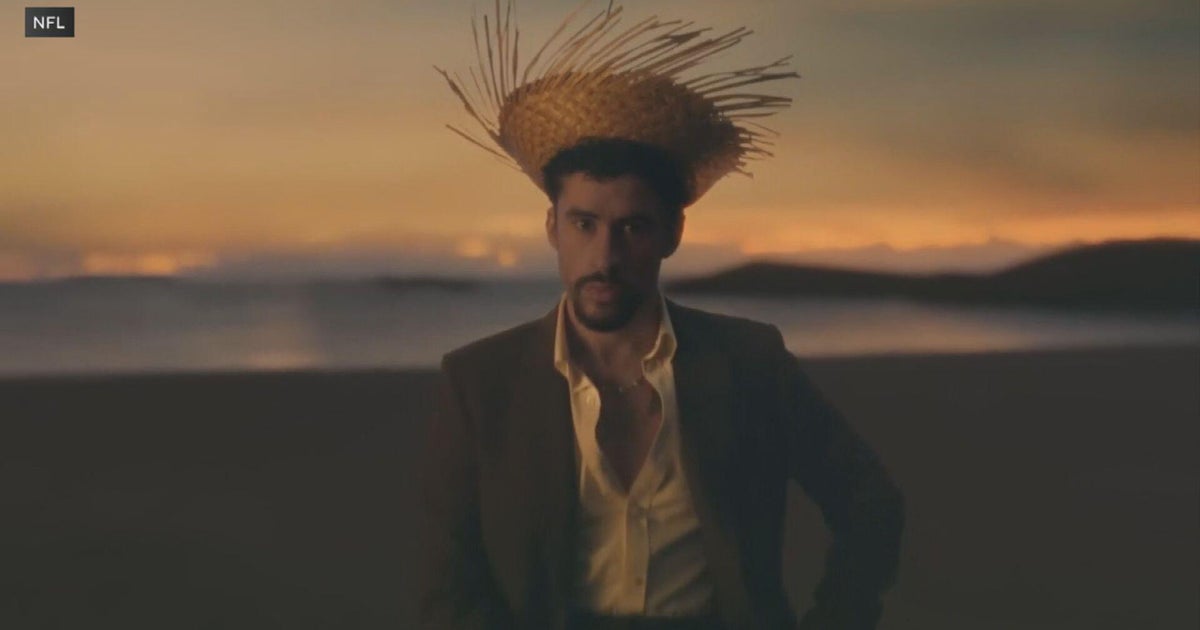Finding the essential Neil Diamond
Let's face it, it's never been "fashionable" to be a Neil Diamond fan. He may have written more than 40 top 40 hits. He may have sold 120 million records. He was the top drawing solo performer for the entire decade of the 1990s.
But Neil Diamond has never been "hip."
His new album could change all that, CBS News correspondent Anthony Mason believes.
With "12 Songs" Diamond has delivered some of his most disarmingly direct lyrics.
From the song "Evermore": "Have we come this far, to have gone astray. I've been lost before, but not lost this way."
At 64, and grandfather of four, his baritone can still burrow under your skin. The sound has the soulfulness of some of Diamond's earliest music.
It's winning exceptional reviews. Four stars in People, an "A" from Entertainment Weekly, front to back, maybe the best he's ever recorded, Mason says.
"It does bring me back to my roots and basic records that I made when I first started out," Diamond explains.
The Brooklyn-born Diamond started out by dropping out of New York University to become a $50 a week songwriter.
"Well I got a job offer. And, you know, when you get a serious job offer that would make me a professional songwriter, I took it," Diamond says of his decision.
Go back to the beginning with Diamond and you'll end up at The Bitter End, the New York nightclub where he first performed.
As Mason and Diamond stand near the club, Diamond is asked when he was last there. "Sometime B.C.," laugh Diamond. "30-35 years ago."
Noticing a familiar face inside, Diamond calls out, "Paul." The man is Paul Colby, owner of The Bitter End since 1974. Colby was the club's manager starting in 1968.
"That guy hired me more times than I deserved to be hired," Diamond says of Colby.
In the 1960s, the Greenwich Village club was a mecca for songwriters.
Looking at photos from their early days in the music business, Diamond says, "I look like a baby."
"We were both babies," Colby replies.
Feeling nostalgic, Diamond asks, "Can I step up on the stage and just see what it feels like to be a twenty-five again?"
There was enormous prestige in playing The Bitter End's small stage.
"It was, my beginning was right here. So, you know, and this guy hired me, so what can I say? God bless you Paul Colby," Diamond says. "Thanks pal."
Letting his sentimentality take control, Diamond wanders into a back hallway. Referring to The Bitter End's original owner, Fred Weintraub, Diamond recalls, "Believe or not, Freddy paid me here. One day after a show he paid me cash in back here and, let me see, yeah, this looks about like the right place.
"It's right here and he said, 'Neil, here's the $50 bucks in cash and you did great.' And, you know, I thought it was, you know, I was flying. That was the first time I became a professional performer," Diamond says.
Diamond broke through in 1966 with "Cherry, Cherry."
After that the hits came like rain. Fifteen in just five years and with "Cracklin' Rosie" in 1970, he finally cracked number one.
But slowly the arrangements became bigger, his shirts became louder. The "Jewish Elvis" became a kitsch icon. His fans have always followed him, but by the mid-1980s, critics dismissed Diamond as a sequined antique.
"I think at some point the glittery shirts kind of took people's ears away from the music. And it was easy to make fun of him," acclaimed music producer Rick Rubin says of Diamond.
Rubin is the producer of Diamond's new album. "The goal wasn't to go backwards, but to get to the essence of who he was," Rubin explains.
They make an unlikely couple. Rubin, who co-founded Def Jam Records, is known for producing alternative rock groups and hip hop acts.
"I grew up loving Neil Diamond," Rubin says. "I think he's one of the greatest song writers of our time."
It was Rubin who reached out to Diamond. "I don't think he was very familiar with my work," Rubin says.
"I had no idea what he even looked like," Diamond admits.
At first, the two men just met to talk. "It started informally, but it was once a week. It turned into a once a week meeting. It was almost like a therapy session. And we would just talk about music and what was going on," Rubin recalls.
Then Diamond, who works in pencil on yellow legal pads, began to write and Rubin, who listens barefoot and Buddha-like on his library couch, encouraged Diamond to keep it pure and simple.
"I followed, you know, kicking and screaming all the way, until I realized that this guy's absolutely right," Diamond says.
And why was Diamond "kicking and screaming," Mason asks? "Because," Diamond says, "I hadn't done this in a long time. Rick insisted that I play guitar while I was singing. And I stopped that many years ago because I always felt that there were better guitar players than me."
Rubin explains Diamond's modesty, saying, "Yeah, he's very insecure about his musicianship. But, there's a soulful quality and there's a truth to what he's doing on guitar that no one else could do.
"Although it would make him shudder to think that," Rubin says, "It's the truth."
One of the album's most striking songs is "Hell Yeah," an aging Diamond's conversation with his audience. "If you're asking me to tell was it worth what I paid, you're gonna hear me say, 'Hell yeah, it is,'" one set of the song's lyrics go.
"You know, maybe we raised the bar a little bit. Maybe it was just for me to feel that I'm a vital, creative force still, at this age, and after doing this for 40 years," Diamond says of his new album.
Asked if the experience was enjoyable, Diamond says, "It was a kind of painful enjoyment."
Diamond is meticulous about every detail of his music. At his Los Angeles studio, where the album was still being mixed, something caught his ear as he listened to "Hell Yeah."
"There's one word I don't like. I've been trying to examine it," Diamond says.
"I don't have my glasses on. So, I mean, I can write, but I can't read. What's that word," Diamond asks Mason?
The word was "to," Mason says.
When pressed to explain what the essence of Neil Diamond is, Rubin says, "He's a rock 'n' roll songwriter who writes songs that are not rock 'n' roll songs. I don't really know what genre they're coming from because, when you hear some of these songs no other rock artist would write these songs. It's not rock music. But it is rock music."
The inability to pin Diamond into one genre or style has left him somewhat of an outsider in the rock 'n' roll community, Mason says.
Does his outsider status bother Diamond?
"Sometimes, yeah, but I think I've been an outsider for most of my life," Diamond admits. "Even when I was a kid. I think, in a way, I prefer it.
"I've got along for the most part in my career without critical acceptance," Diamond adds.
But, it bothers him. You can tell, Mason observes.
"Ask me again about critics and you'll watch me destroy my career in just one feel swoop," Diamond says candidly.
For a moment, Diamond threatened to retaliate. Then he thought better of it. "And that's all I'm gonna say," Diamond says.
Laughing, Diamond adds, "Somebody get this microphone off me before I destroy my whole life."
But this time even Rolling Stone, which has always questioned Diamond's rock credentials, has given "12 Songs" four stars.
"It's the very essential and basic music. It's one guy singing, you know, it's not Caruso and it's not Pavarotti, but it's real," Diamond says of his music.
"I feel very lucky to have found my place. And it's like I refound it," he says.
We are still singing his songs. Now a chorus of critics is singing his praises. Is Neil Diamond a great songwriter? Hell yeah, he is, Mason concludes.



